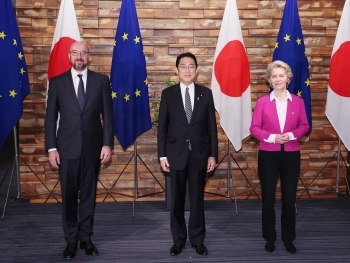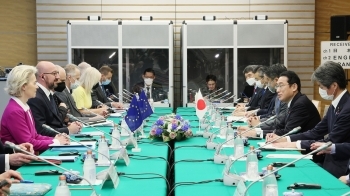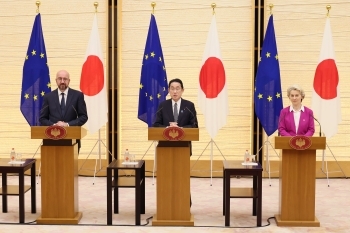Japan-EU Relations
The 28th Japan-EU Summit
May 12, 2022
 Japan-EU Summit
(Photo: Cabinet Public Affairs Office)
Japan-EU Summit
(Photo: Cabinet Public Affairs Office)
 Japan-EU Summit
(Photo: Cabinet Public Affairs Office)
Japan-EU Summit
(Photo: Cabinet Public Affairs Office)
 Joint Press Announcement
(Photo: Cabinet Public Affairs Office)
Joint Press Announcement
(Photo: Cabinet Public Affairs Office)
On May 12, commencing at 10:30 a.m. for approximately 60 minutes, Mr. KISHIDA Fumio, Prime Minister of Japan, held the 28th Japan-European Union (EU) Summit with H.E. Mr. Charles Michel, President of the European Council, and H.E. Dr. Ursula von der Leyen, President of the European Commission, who were visiting Japan.
Following the joint press announcement held after the Summit Meeting, a working lunch was held from 12:00 noon for approximately 60 minutes. Below is the overview of the Summit Meeting and working lunch. In addition, the Japan-EU Joint Statement and document on the Japan-EU Digital Partnership were issued on the occasion of the Summit Meeting.
1. Opening Remarks
- (1) At the outset, Prime Minister Kishida welcomed President Michel and President von der Leyen, who were on their first visit to Japan after assuming office.
- (2) Prime Minister Kishida stated that Russia’s aggression against Ukraine is an act that shakes the very foundations of the international order. He also stated that Japan has been implementing the strong sanctions against Russia and strengthening support to Ukraine in cooperation with the EU, and would continue to respond to Russia’s aggression with firm determination and that the security of Europe and the Indo-Pacific is inseparable, and any unilateral changes of the status quo by force is absolutely unacceptable anywhere in the world. He expressed the intent to cooperate between Japan and the EU, which share fundamental values, in working for the realization of a “Free and Open Indo-Pacific.”
- (3) President Michel and President von der Leyen expressed their pleasure at being able to hold an in-person meeting in Tokyo. They expressed their gratitude for Japan’s strong sanctions against Russia and solidarity with Ukraine and Europe. They stated their wish to strengthen Japan-EU cooperation on trade, climate, digital, Indo-Pacific, and other issues as partners sharing an international order based on fundamental values and rules.
2. Japan-EU Relations
- (1) Both sides concurred that Japan and the EU will further promote Japan-EU economic cooperation based on the Japan-EU EPA in order to maintain and strengthen the rules-based free and fair international economic order.
- (2) Prime Minister Kishida reiterated his request for the early lifting of the EU’s import measures on Japanese food products.
- (3) Both sides agreed on and welcomed the launching of the Japan-EU Digital Partnership, a comprehensive framework for broad-ranging cooperation across digital areas, including the Data Free Flow with Trust (DFFT), trade, privacy, security, trust, data utilization, and infrastructure.
- (4) Both sides welcomed the agreement in principle on a Japan-EU horizontal agreement for air service.
- (5) Prime Minister Kishida commended the “Global Gateway” strategy set out by the EU last December and the both sides concurred that it is important for Japan and the EU to work together to improve connectivity through the building of quality infrastructure and that they will continue to cooperate under the Japan-EU Connectivity Partnership.
- (6) Prime Minister Kishida stated that climate change countermeasures are at the center of Japan’s “New Form of Capitalism.” He welcomed the progress being made in Japan-EU cooperation in such areas as hydrogen, energy transition, environmental protection, and sustainable finance under the Japan-EU Green Alliance launched last year. The EU side stated that the EU compliments the “New Form of Capitalism.” Both sides shared the view to continue to accelerate Japan-EU efforts in the climate change and environmental areas and strive to lead the international community in such areas.
- (7) Both sides welcomed progress made in Japan-EU cooperation in the areas of joint exercises and capacity building support. In light of the EU’s “Strategic Compass” announced in March, they expressed hopes for further progress in Japan-EU security and defense cooperation.
3. International and Regional Situations
- (1)Based on the recognition that Russia’s aggression against Ukraine is a serious situation that shakes the foundations of the international order not only in Europe, but also in Asia, both sides reaffirmed the importance for the G7 and the international community to unite and cooperate in their response. Prime Minister Kishida also explained that he has been actively engaged in outreach to the Asian countries. The EU side expressed gratitude for Japan’s efforts. Both sides concurred on the importance of outreach to Asia, Africa and other nations, also from the standpoint of the world’s food security.
- (2) Both sides also exchanged views on the situation in the East Asia. They shared strong concerns about unilateral attempts to change the status quo by force or coercion in the East and South China Seas, the rapid build-up of military power lacking transparency, and increased military activities in the region. Both sides confirmed the importance of peace and stability across the Taiwan Strait and concurred to encourage the peaceful resolution of cross-Strait issues. They shared serious concerns about the situation surrounding Hong Kong and the human rights situation in the Xinjiang Uygur Autonomous Region. They confirmed their united and resolute response to unilateral attempts to change the status quo and economic coercion.
- (3) Both sides also exchanged views on North Korea, sharing serious concerns about the increasingly intensive nuclear and missile activities including the recent series of ballistic missile launches. They also reaffirmed their continued coordination in addressing North Korea, including the abductions issue.
- (4) In addition, both sides exchanged views on the situation in Iran and other issues.
4. Cooperation in the International Arena
- (1) Both sides discussed economic security, energy, food security, Covid-19, and other issues facing the international community, and shared the view that Japan and the EU will promote cooperation in these areas.
- (2) Prime Minister Kishida expressed his intention to cooperate with the EU and the EU member states toward a world without nuclear weapons. Both sides concurred on further cooperation in this area. Prime Minister Kishida also stated his hope that President Michel would get acquainted with the realities of the use of atomic bombings and feel the fervent wish for peace on the occasion of his visit to Hiroshima from May 12.
[Reference] Attached pdf files
- (1) Japan-EU Joint Statement (Gist (Japanese) (PDF)
 / Japanese (PDF)
/ Japanese (PDF) / English (PDF)
/ English (PDF) )
) - (2) Document on Japan-EU Digital Partnership (Summary (Japanese) (PDF)
 / Japanese (PDF)
/ Japanese (PDF) / English (PDF)
/ English (PDF) )
)

